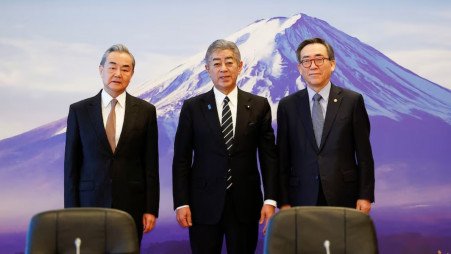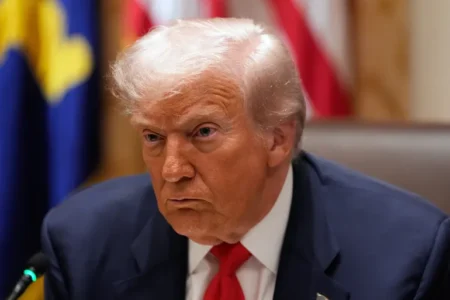The foreign ministers of Japan, China, and South Korea met in Tokyo on Saturday to discuss regional security and economic cooperation amid increasing global instability. The high-level talks come at a time of shifting geopolitical dynamics, with all three nations seeking ways to navigate pressing challenges.
Historic Turning Point in Global Relations
Japanese Foreign Minister Takeshi Iwaya described the meeting as occurring at a “turning point in history,” emphasizing the urgency of collaboration between the three nations. He met with Chinese Foreign Minister Wang Yi and South Korean Foreign Minister Cho Tae-yul to explore opportunities for trilateral cooperation.
The discussions covered economic policies, security concerns, and demographic challenges, with the ministers agreeing to expedite preparations for an upcoming trilateral summit in Japan. Key topics included addressing declining birth rates, aging populations, and economic strategies for mutual growth.
China Pushes for Free Trade Expansion
China, eager to solidify its economic influence in the region, expressed a strong interest in resuming free trade negotiations. Wang Yi highlighted the economic power of the three nations, which collectively hold a population of nearly 1.6 billion and an economic output exceeding $24 trillion. He also called for the expansion of the 15-nation Regional Comprehensive Economic Partnership (RCEP), an Asia-Pacific trade agreement that includes China, Japan, and South Korea.
“With our vast markets and great potential, we can exert significant influence,” Wang stated, reinforcing China’s vision for greater economic collaboration.
Security Disagreements and Diplomatic Tensions
Despite economic cooperation efforts, deep political and security divisions remain. Beijing’s support for North Korea, its military actions around Taiwan, and its alliance with Russia in the Ukraine war continue to be points of contention with Japan and South Korea.
South Korean Foreign Minister Cho Tae-yul pressed China to play a more active role in persuading North Korea to abandon its nuclear weapons program. “I also stressed that illegal military cooperation between Russia and North Korea should stop immediately, and that North Korea should not be rewarded for its wrongdoings in the course of bringing about the end of the war in Ukraine,” Cho said.
Japan and South Korea, both close US allies that host thousands of American troops, share Washington’s stance that China poses an increasing regional security challenge. This divergence in strategic interests has complicated diplomatic efforts, even as economic ties remain strong.
Bilateral Talks Address Economic Concerns
Following the main meeting, Iwaya scheduled separate discussions with his Chinese and South Korean counterparts. One key agenda item was the first high-level economic dialogue between Japan and China in six years. The talks are expected to address trade barriers, including Beijing’s ban on Japanese seafood imports, which China imposed after Japan began releasing treated wastewater from the damaged Fukushima nuclear plant in 2023.
Iwaya expressed hope for progress on the matter, emphasizing the need for scientific and transparent discussions to resolve the dispute.
Trilateral Summit in Japan
As the three nations work toward a broader diplomatic summit, the meeting in Tokyo underscores both the opportunities and challenges in East Asian relations. While economic collaboration remains a key focus, longstanding security concerns and political tensions will continue to shape the region’s geopolitical landscape.







